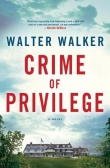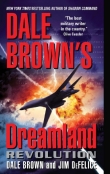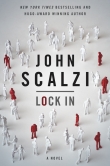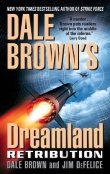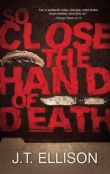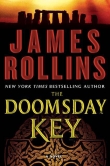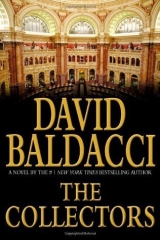
Текст книги "The Collectors"
Автор книги: David Baldacci
сообщить о нарушении
Текущая страница: 18 (всего у книги 27 страниц)
Chapter 44
“I was able to get him a lawyer,” Caleb said. “Although he was so young and so cheap, I don’t know how effective he’ll be. But I told a little white lie and said that Reuben was staying there at my request to watch over the book collection, which is why he had the house keys and the alarm code. And I also gave that statement to the police. I told them Jonathan’s lawyer’s name so he could confirm my role as literary executor.”
Milton and Caleb were at Stone’s cottage. The stunning news of Reuben’s arrest for the murders of Cornelius Behan and his lady friend was evident in the group’s somber looks.
“Will he get out on bail?” Milton asked.
Stone shook his head. “It’s doubtful considering Reuben’s personal situation and the circumstances of the case. But perhaps with the information Caleb gave them they’ll reconsider the charges.”
Caleb said, “I saw Reuben briefly this morning. He said he was watching Behan’s house when he noticed the fire and then someone hit him on the head and knocked him out. When he came to, he saw that Behan and his girlfriend were dead. When he tried to leave, the police nabbed him.”
“The papers have had a field day with Behan being found dead with his naked mistress. Apparently, Mrs. Behan was in New York last night,” Milton added.
Stone said, “What we have to do is find the real killer.”
Milton said, “How exactly do we accomplish that?”
“By following through on our investigation.” He glanced sharply at Caleb. “We have to get a look at those security videos from the library.”
“Susan said she was going to help me do that. I haven’t heard from her.”
“I suggest you come up with your own way, then.”
Caleb looked surprised but didn’t question Stone’s instruction.
Stone said, “I think we can safely assume that Behan and Bradley were not friends. I initially thought that Behan had Bradley killed, and that may still be true, but then who killed Behan and why?”
Milton suggested, “Revenge for his killing Bradley?”
“If so, we have to look at possible suspects from that angle.” Stone glanced at Milton. “I’ll need to see members of Bradley’s staff, known associates, perhaps friends in the military or intelligence communities who had the skill and other means to kill Behan.”
Milton nodded. “There’s something called the Unelected Directory that could be helpful. It might take longer to get anything on the military and intelligence end, though.”
“Whoever killed Behan knew that Reuben was in the house and framed him for it. That means they were watching the place as well.”
“The people in the house across the street that Reuben mentioned?” Caleb hazarded.
Stone shook his head. “No. The fire was probably set by an accomplice of the killer. They must’ve known that there was surveillance going on inside that house. The fire was a distraction, giving them an opportunity to get in the house, kill Behan and escape.”
“Pretty clever,” Caleb commented.
Stone said, “I’m going downtown to see Reuben.”
“Won’t they ask for ID or something, Oliver?” Milton pointed out.
“They can ask, but the last time I checked, not having any wasn’t a crime.”
“I bet Susan can get you an ID,” Milton suggested. “She had FBI credentials that looked like the real thing.”
Caleb said, “Where is our intrepid colleague?”
“She had other plans,” Stone answered.
• • •
Jerry Bagger sat in his office with a look of defeat rare in the man. Photos of Annabelle and Leo had been discreetly circulated to every corner of the con world, and no one had come forward to offer an ID. It wasn’t surprising considering there was not one single clear shot of her or her grunt. It was like they knew exactly where the surveillance cameras were posted. And though his people had done their best to forestall it, news of the con against Bagger had leaked out in bits and pieces, which was probably worse than the truth all being revealed, since it allowed ample room for speculation. In sum, the casino king was a laughingstock. That only fueled his desire to find the pair and run them through a buzz saw while he videotaped their last horrendous moments on earth.
Their rooms had been gone over, and not a single print had been found. Any drinking glasses that the woman and her sidekick touched had long since been cleaned. The cell phone she’d thrown against the wall had gone in the Dumpster and was now resting in the landfill of whatever state Jersey shipped its garbage to. The four–day window had dried up their trail. Bagger put his head in his hands. And he’d been the one to suggest the extended time frame. He had, in effect, conned himself.
And that was the bitch’s plan all along. She gave me just enough rope to hang myself.
He rose and went over to the wall of windows. He’d prided himself on being able to sniff out scams long before they had a chance to do him any harm. However, the fact was this was the first con perpetrated on him directly; all others had been focused on his casino. Those were short cons, aimed at relieving money from his craps, blackjack and roulette tables. This had been a long con orchestrated by a woman who knew exactly what she was doing, and used every asset she had, including that old reliable, sex.
Yet she had been so damn convincing. He went through her spiel over and over in his mind. She had turned the tap on and off at just the right interval. She had him convinced that she was a spy working for the government. And these days, with all the crap the feds were involved in, it was hard not to believe even the most outrageous stories.
He gazed out the window, and his mind went back to that telephone call, the one where she wanted to meet after ferreting out his security detail following her. He’d lied that he was already gone from the office, heading out of town. She’d told him point–blank that he was still in his office. That one comment had made him believe that she was legit, that the spooks were really watching him. Watching him!
He stared across the street at the hotel. It reached twenty–three stories off the Boardwalk, identical to his building. The line of windows there looked right into his office. Son of a bitch! That was it! He screamed for his security chief.
• • •
After a bit of hassle and tough questioning and finally a call to Reuben’s lawyer, Oliver Stone was allowed in to see his friend in his cell. When the door clanged shut behind him, Stone jumped slightly. He had been imprisoned before, though not in an American facility. No, that wasn’t right, he corrected himself. His recent torture had certainly been by fellow Americans on U.S. soil.
Assuming that the room was being monitored, Stone and Reuben talked in low voices using few words. And Stone started tapping his feet on the concrete floor.
Reuben caught on to what he was doing. “Think the sound will mess up their electronic eavesdropping?” he whispered, his look skeptical.
“Not really, but it’ll make me feel better.”
Reuben smiled and started tap–dancing too. “The fire?” he muttered.
“Yes, I know,” Stone said. “You okay?”
“Just a knock in the head. My lawyer’s going to use that as a defense.”
“Prints on the gun?”
“Accidental touch.”
“Caleb explained things to the police. You were there guarding the books.” Reuben nodded. “Anything else?”
The other man shook his head. “Other than the peep show. Never saw it coming.”
“Following through, just so you know.”
“Connected?”
Stone gave a barely perceptible nod. “Need anything?”
“Yeah, Johnnie Cochran. Too bad he’s in the big courtroom in the sky.” He paused. “Susan?”
Stone hesitated. “Busy.”
As Stone left the building later, he noted that two men – obviously police – were following at a discreet distance.
“I’ll let you hang with me but just for a little while,” he muttered to himself. He was already thinking about the next person he needed to talk to.
Chapter 45
Roger Seagraves read the news story off his computer screen at work. The murder suspect had been identified as Reuben Rhodes. Former military and DIA with a drinking problem who’d burned just about every bridge he had over the years. He worked at a loading dock in D.C. and lived in basically a shack in the outer reaches of northern Virginia. The guy was a walking time bomb, the story had clearly implied. And this hater of war had killed a man who’d made a fortune from providing the deadly toys all armies needed to fight. It really was too good to be true.
When Seagraves first saw the big man entering the house through the back door, he didn’t know what to make of it. A burglar, he thought at first, yet the house alarm hadn’t gone off, and the man came out early the next morning with nothing in his hands. When he returned the following night, Seagraves knew he had a golden opportunity to put a very nice buffer between him and the police.
He pulled his hours for the government and then punched off the federal clock. Now the time was his alone. Seagraves had another little pickup to do. It wouldn’t be as pleasant as his sack time with the lady from NSA, but business couldn’t always be like that. It was important to keep his sources happy and functioning and, at the same time, ensure that no suspicion was falling on them. It was fortunate that with his position at CIA he had informal access to some of the investigations going on regarding domestic spy rings. While it was true that the FBI also played a large role in such matters, and he had few contacts there, it was still an asset to know which persons his agency had deemed “of interest.”
It was a testament to his skill that the arrow had never pointed his way. It seemed the CIA couldn’t believe that one of its former assassins would ever go into business on his own. Did they really think that was how the world worked? If so, he sincerely feared for his country’s safety if its premier intelligence agency could be so easily hoodwinked. Yet then there was Aldrich Ames, after all. But Seagraves was far different than that spy.
Seagraves had killed people under orders from his government. Thus, normal rules of engagement – to wit, law and order – did not apply to him. He was like a professional athlete, able to get away with much because of what he could bring on the field. Yet the traits that made them so formidable on the court or gridiron also made them dangerously aggressive off it. If Seagraves could get away with killing all those years, he felt there was nothing he couldn’t do. And even when he pulled a trigger for a living, he never really felt like he was working for someone else. It was his ass out there, whether in the Middle or Far East or any other place he was directed to go and snuff out a life. He was a loner, his psychological profile had confirmed that, and was one reason he’d been recruited as an assassin in the first place.
He drove to a fitness facility in McLean, Virginia, a short drive down Chain Bridge Road from CIA headquarters. He was playing tennis with his section chief, a man who prided himself on his patriotism, job efficiency and his top spin backhand.
They split the first two sets, and Seagraves debated whether to let his boss win the third set. Finally, his competitive spirit won out, though he made it look close. He had fifteen years on the guy, after all.
“Kicked my butt, Roger,” his boss said.
“I was just on my game tonight. But you didn’t make it easy on me. If we were the same age, I don’t think I could hang with you on the court.”
This man had been a career seat warmer at Langley. The closest he got to real danger were the thriller novels he liked to read. His boss knew very little of Seagraves’ past work for the Agency. The Triple Six Club was a closely guarded secret, for obvious reasons. However, the man did know that Seagraves had worked in the field for many years, in places that the Agency had consistently rated as top “hot spots.” For this reason Seagraves was accorded far more deference and respect than the average wonk down the hall.
Back in the locker room while his boss finished his shower, Seagraves opened his locker and took a towel out. He wiped his face and then went to dry his hair. He and his boss drove to the Reston Town Center and had dinner at Clyde’s Restaurant, settling in near the gas fireplace in the center of the elegant dining area. After eating they parted company. While his boss drove off, Seagraves strolled along the town center’s Main Street, pausing in front of the movie theater.
It was in places like this and in local area parks that spies in the past had made their drops or picked up their money. Seagraves envisioned the subtle handing off of a bucket of popcorn with something more than extra butter lying within; a subtle but ultimately clumsy practice of the art of espionage. He had already made his pickup spending the evening with his section chief, and there was no chance anyone had observed how it had been done. The CIA almost never undertook surveillance of two employees out together, particularly for tennis and dinner. Their notion of traditional spies mandated that it was a solitary occupation, which was why he’d invited his clueless boss to come along.
He drove home, took the towel he’d kept from the locker room and walked into a small room in his basement that was concrete with specialized lining, his little “safe” room of sorts that kept prying eyes away. He set the towel down on a table along with a handheld steamer. The fitness center’s logo was woven into the towel’s surface. Well, it would have been if this had actually been the fitness center’s towel. It was a very acceptable facsimile, but the logo was merely sitting on top of the fabric, like iron–on patches kids put on their clothes. The steamer quickly removed the logo. On the other side of it was the thing Seagraves had sweated through three sets of tennis for: four two–inch–long slivers of tape.
Using a sophisticated magnifying device that, for some reason, his employer allowed its personnel at certain levels to possess, he read and decrypted the information contained on the slivers. He then reencrypted it and put it in proper form to transport to Albert Trent. This took him until midnight but he didn’t mind. As a killer he had often worked at night, and old habits died hard.
Finished with that, he had one more task to perform before he would call it a night. He went down to his special closet, unlocked and disarmed it and stepped inside. He came here at least once a day to look at his collection. And tonight he had one addition to make, although he was irked it was only one, since it should have been a pair. He withdrew the object from his coat pocket. It was a cuff link of Cornelius Behan’s that an associate of Seagraves’, who worked for Fire Control, Inc., had given him. Behan had apparently dropped it while visiting the storage facility, a visit that had ultimately cost him his life. Behan had apparently figured out the cause of Jonathan DeHaven’s death, and he couldn’t be allowed to share that with anyone.
Seagraves placed the cuff link on a small shelf on the wall next to the baby’s bib. He had nothing as yet of the young woman he’d shot. He’d eventually track her identity down and obtain something of hers. He’d shot Behan first. The man had slumped over, leaving him with a clean angle to take out the girl. She was about to perform a lewd act on Behan. On her knees she stared out the window, where the first shot had come from. Seagraves had no idea if she could see him, but it didn’t really matter. He didn’t even give her a chance to scream. The bullet really did a number on her pretty face. It would no doubt be a closed casket, the same for Behan. The exit wound was always bigger than the entrance.
As he stared at the empty space next to the cuff link, Seagraves made a promise that he would find an item of hers and his collection would be 100 percent up–to–date. Just the way he liked it.
Chapter 46
It took Stone some effort, but he managed to lose the men tailing him. He immediately went to an abandoned home near the graveyard that he used as a safe house. He changed clothes and headed to Good Fellow Street. He passed DeHaven’s house and then Behan’s. There were reporters camped outside Behan’s manse obviously waiting for an appearance by the unfortunate and humiliated widow. The damaged home across the street appeared to be empty.
As he watched the Behan house from the corner while pretending to consult a map, a large furniture van pulled up in front of the home and two burly men got out. A maid opened the front door as the reporters tensed. The men went inside and a few minutes later came out carrying a large wooden chest. Even though the men were obviously very strong, they struggled with the weight. Stone could sense the thoughts of the reporters: Mrs. Behan was hidden in the chest to escape the media. What a scoop that would be!
The cell phones came out, and a number of the journalists leaped into their cars and followed the van as it pulled down the road. Two cars covering the rear of the house zoomed in from the block behind the Behans’. However, a few reporters remained behind, obviously sensing a trick. They pretended to move off down the street but took up positions just out of sight of the Behans’. A minute later the front door opened again and a woman in a maid’s uniform appeared, wearing a big floppy hat. She climbed into a car parked in the front courtyard of the house and drove out.
Again Stone could sense the reporters’ collective thoughts. The furniture van was a decoy, and the missus was disguised as the maid. The remaining journalists ran for their vehicles and followed the maid’s car. Two more journalists came from the next street over, no doubt alerted to this development by their colleagues.
Stone promptly walked around the corner and down to the next block that abutted the rear of the Behans’ property. There was an alleyway here, and he waited behind a nearby hedge. His wait was a short one. Marilyn Behan appeared a few minutes later, wearing slacks, a long black coat and a wide–brimmed hat pulled low. When she got to the end of the alley, she cautiously peered around.
Stone stepped out from the cover of the hedge. “Mrs. Behan?”
She jumped and looked around at him.
“Who are you? A damn reporter?” she snapped.
“No, I’m a friend of Caleb Shaw’s. He works at the Library of Congress. We met at Jonathan DeHaven’s funeral.”
She seemed to be searching her memory. From her demeanor she seemed a little stoned, he thought. There was no smell of liquor on her breath, though. So was it drugs?
“Oh, yes, I remember now. I made my little quip about CB understanding instant death.” She suddenly coughed and reached in her handbag for a tissue.
“I wanted to offer my condolences,” Stone said, hoping that the woman wouldn’t remember that Reuben, her husband’s alleged killer, had also been in their group.
“Thank you.” She glanced back down the alley. “I guess this seems a little odd and all.”
“I saw the reporters, Mrs. Behan. It must be a nightmarish situation for you. But you did fool them. That’s not easy to do.”
“When you’re married to a very wealthy man who stirs up controversy, you learn how to duck the media.”
“Could I talk to you for a few minutes? Maybe over a cup of coffee.”
She seemed flustered. “I don’t know. This is a very difficult time for me.” Her face screwed up. “I just lost my husband, damn it!”
Stone remained unperturbed. “This concerns your husband’s death. I wanted to ask you about something he said at the funeral.”
She froze and then asked suspiciously, “What do you know about his death?”
“Not nearly as much as I’d like to. But I think it might have some connection to Jonathan DeHaven’s death. It seems very mysterious, after all, that two next–door neighbors should die under such … unusual circumstances.”
She suddenly looked very calculating. “You don’t think DeHaven died of a heart attack either, do you?”
Either? “Mrs. DeHaven, can you spare a few minutes? Please, it’s important.”
They had coffee at a nearby deli. Sitting at a back table, Stone said bluntly, “Your husband mentioned something to you about DeHaven’s death, didn’t he?”
She sipped her coffee, pulled her hat down lower and said quietly, “CB didn’t believe he’d had a heart attack, I can tell you that.”
“Why not? What did he know?”
“I’m not sure. He never really said anything directly to me about it.”
“Then how do you know he had doubts?”
Marilyn Behan hesitated. “I’m not sure why I should tell you anything.”
“Let me be honest with you in the hopes that you’ll return the favor.” He told her about Reuben and why he was in the house, though he tactfully didn’t mention the telescope. “He didn’t kill your husband, Mrs. Behan. He was only there because I told him to watch the house. There are a lot of strange things going on, on Good Fellow Street.”
“Like what?”
“Like the person in the house across the street.”
She said nervously, “I didn’t know anything about that. And CB never mentioned it. I know that he felt that people were spying on him though. Like the FBI, trying to dig up some dirt on him. Maybe they were, maybe they weren’t, but he’s made a lot of enemies.”
“You said he didn’t say anything directly to you about Jonathan’s death, but at the funeral he seemed to want assurance that it was indeed a heart attack that killed him. He mentioned that autopsies are sometimes wrong.”
She put down her coffee and rubbed nervously at the red lipstick on the rim of the cup. “I overheard CB on the phone one day. I wasn’t eavesdropping or anything,” she added quickly. “I was looking for a book, and he was in the library on a call. The door was partially open.”
“I’m sure it was unintentional on your part,” Stone said.
“Well, he was telling someone that he’d found out DeHaven had just had a heart workup at Johns Hopkins and that he was in fine shape. And then he said he’d pulled some strings with the D.C. police and learned that DeHaven’s autopsy results were not making people happy at all. They just didn’t add up. He sounded worried and said he wanted to check more into it.”
“And did he?”
“Well, I don’t usually ask him where he’s going, and he accorded me the same courtesy. I mean, the circumstances of his death evidently showed that he strayed at times. I was flying to New York and was in a bit of a hurry, but for some reason, I don’t know, maybe it was his concerned look, I asked him where he was going, if anything was wrong. I didn’t even know he owned the damn company, to tell the truth.”
“Company? What company?”
“Fire Control, Inc., I think it was. Something like that anyway.”
“He went to Fire Control?”
“Yes.”
“Did he tell you why?”
“Just that he wanted to check something out. Oh, he did mention the library, or at least the place where Jonathan worked. Something about his company having the contract to protect it against fire and such. And that he’d learned that some cylinders had been recently removed from there. He also said there seemed to be an inventory screwup.”
“Do you know if he found anything?”
“No. As I said, I went to New York. He didn’t call me. But when I called him, he didn’t mention it, and I had forgotten about it by then.”
“Did he sound disturbed when you talked to him?”
“No more than usual.” She paused. “Oh, he did say he was going to check the pipes in our house. I thought he was joking.”
“The pipes? What was he referring to?”
“I don’t know. I assumed our gas line pipes. I guess they can leak, and there could be an explosion.”
Stone initially thought, Like what happened to Speaker of the House Bob Bradley. But then something else occurred to him.
“Mrs. Behan, do you have a sprinkler system in your house?”
“Oh, no. We have a large collection of artwork, so water was out of the question. But CB was concerned about fire. I mean, look what happened across the street. He had another system put in, one that put out fire without using water. I’m not sure how it works.”
“That’s all right, I think I know.”
“So you believe whoever killed Jonathan also murdered CB?”
Stone nodded. “I do. And if I were you, I’d go and stay at another of your homes, as far away from here as possible.”
Her eyes widened. “You think I’m in danger?”
“I think you might be.”
“I’ll go back to New York, then. I’ll leave this afternoon.”
“I think that would be wise.”
“I suppose the police will let me. I had to give them my passport, though. I suppose I’m a suspect. I am the wife, after all. My alibi is ironclad, but I suppose I could have hired someone to kill him while I was away.”
“It has been done before,” Stone conceded.
They sat in silence for a minute or so. “You know, CB really did love me.”
“I’m sure he did,” Stone said politely.
“No, I know what you’re thinking. But he did love me. The other women, they were just playthings. They came and they went. I was the only one who got him to walk down the aisle. And he left everything to me.” She took another sip of her coffee. “You know it’s ironic, he made a fortune building tools of war, but CB actually hated guns, never even owned one. His background was in engineering. He was a brilliant man, and he worked harder than anyone else.” She paused. “He loved me. A woman can tell, you know. And I loved him. With all his faults. I still can’t believe he’s gone. A part of me died with him.” She wiped away a tear from her right eye.
“Mrs. Behan, why lie to me?”
“What?”
“Why lie to me? You don’t even know me. So why bother?”
“What the hell are you talking about? I’m not lying. I did love him.”
“If you really loved him, you wouldn’t have hired a private detective to watch your house from across the street. Was he taking pictures of the comings and goings of the women your husband enjoyed?”
“How dare you! I had nothing to do with that. They were probably the FBI spying on CB.”
“No, the FBI would’ve been smart enough to have a team of agents there, at least one man and a woman to make it seem like a normal household. They would’ve also taken the trash out and performed other ordinary tasks, and they wouldn’t have let themselves be seen during the surveillance. And why would the FBI be watching your home? Would they think it even remotely likely that your husband would meet with some incriminating person there? Not even the FBI has an unlimited budget to cover every base, however implausible.” He shook his head. “I hope you didn’t pay the firm a lot of money, since they were hardly worth it.”
She half rose from her chair. “You bastard!”
“You could’ve just divorced him. Gotten half and walked away a free woman.”
“After he humiliated me like that? Paraded those whores through my house? I wanted to make him suffer. You’re right: I hired a private detective and set him up in that house. So what? And the pictures he’d already taken of my husband and his paid bitches? Well, with those I was going to make old CB bleed and force him to turn over everything to me. Otherwise, it all comes out, and let me tell you, the federal government doesn’t like its contractors putting themselves in compromising positions. CB had top–secret clearances. Maybe he wouldn’t have if the government knew he was doing something he could be blackmailed for. And after he signed everything over to me, then I was going to dump him. He wasn’t the only one playing around. I’ve had my share of lovers, and I’ve picked the one I’m spending the rest of my life with. But now I get everything without even blackmailing him. It’s the perfect revenge.”
“You might want to keep your voice down. As you said, the police no doubt still consider you a suspect. And it’s not smart to give them unnecessary ammo.”
Marilyn Behan looked around at the people in the café staring at her. She paled and sat back down.
Now Stone stood. “Thanks for your time. Your information was very useful.” He added with a completely straight face, “And I’m sorry for your loss.”
She hissed, “Go to hell.”
“Well, if I do, I surely won’t be alone, will I?”
